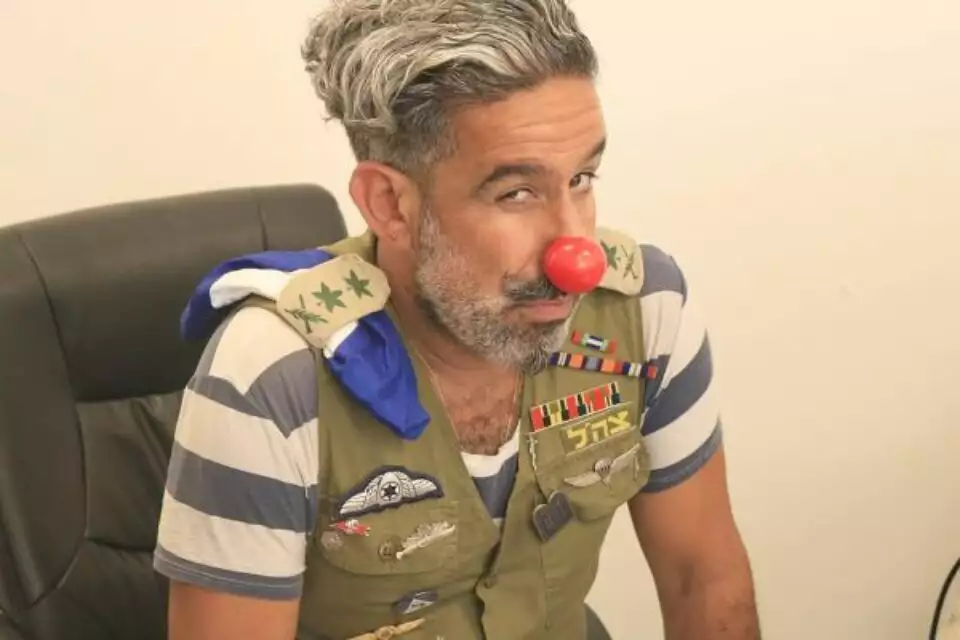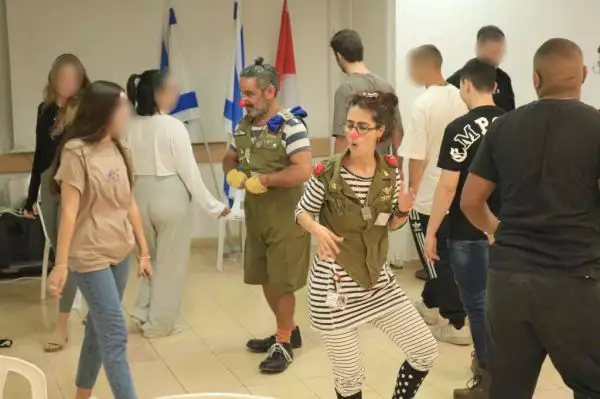
David ‘DuSH’ Barashi has been serving as a Medical Clown at Hadassah Medical Organization in Jerusalem for more than 20 years. And in recent years, DuSH has been managing the Hadassah Clown Unit at the Ein Kerem and Mount Scopus campuses. Routinely, DuSH and the other Hadassah Medical Clowns provide impactful diversions to reduce stress, anxiety and fear experienced during medical procedures.
Immediately after October 7, DuSH and his colleagues were busy visiting war wounded patients being treated at the hospital, working collaboratively with Hadassah’s social workers and the treating teams. Referring to the mayhem at the beginning of the war, DuSH said: "Where there is order, the clown comes in and makes a colourful mess but when it's needed, the clown can bring order. We brought calm, 'familyhood' and empathy into the hospital departments.”
DuSH spoke about when he was asked to help navigate a difficult situation. A wounded man from Kibbutz Be’eri was being treated in Hadassah’s plastic surgery department. “We came there to be in the room when his children arrived to visit their wounded father for the first time” said DuSH, adding that the clowns stayed in touch with the family to help them get through the challenging times.
Before being called up to his IDF reserve unit, DuSH travelled south to help evacuees from the Gaza envelope who had been transferred to Eilat. There, he coined the phrase "Mourning Clowning".
DuSH spent time with families who were sitting Shiva (the seven-day period of mourning). In such situations, DuSH explains that the work is not really to smile, laugh or play with balloons as usual, but mainly to support people and raise their spirits. "The clown is someone who has the ability to connect people. We gave them a reason to lift up their heads, to see each other. We tried to create a human connection everywhere because shared pain creates empathy and a certain hope. It's a very significant part of rehabilitation," said DuSH.
Supporting wounded soldiers
DuSH began his reserve service in the IDF's Homefront Rehabilitation Unit. There, mental health professionals treat soldiers who have been injured in combat, once they have been discharged from hospital.
The commander of the reserve unit is Yoram Ben Yehuda, who lost his son Itamar on October 7 in Kibbutz Nir Oz. When Yoram completed the Shiva, he immediately recruited DuSH to join him.
"We meet parents who are feeling very uncertain. We give them hope and explain the sorts of tools they can use to help. I go with the soldiers to their treatment sessions, give them details about the unit in a fun, clownish and pleasant way, and build their treatment plans with them," explains DuSH.
Bringing back the joy of life
Together with his colleague clown “Jonam”, DuSH has facilitated resilience and therapeutic workshops, teaching injured soldiers the basic principles of acting and clowning, how to build their confidence in front of a crowd, and even how to laugh at themselves.
"We are trying to give the soldiers tools to bring back the joy of life. Humour isn't just laughter; it's a critical resource people use to lift themselves off the floor," DuSH said.
My heart is at Hadassah, no matter what
DuSH recalls special moments during his reserve duty, for example, when wounded soldiers previously hospitalised at Hadassah arrive at the IDF Homefront Rehabilitation Unit. They hug him, happy to see him again as they reflect on their joint journey.
BeIn between his days on reserve duty, DuSH continues to visit Hadassah to keep in touch with the treating teams and the patients.

"The current situation raises many questions about the future – how do I process all of these experiences? It won't be easy to get back to ‘normal’, and anyway it's not clear what kind of ‘normal’ it would be. But my home is Hadassah, and I know that my heart is here no matter what. We will be able to deal with everything because all of us are here, together." concludes DuSH.
Back to Newsletter